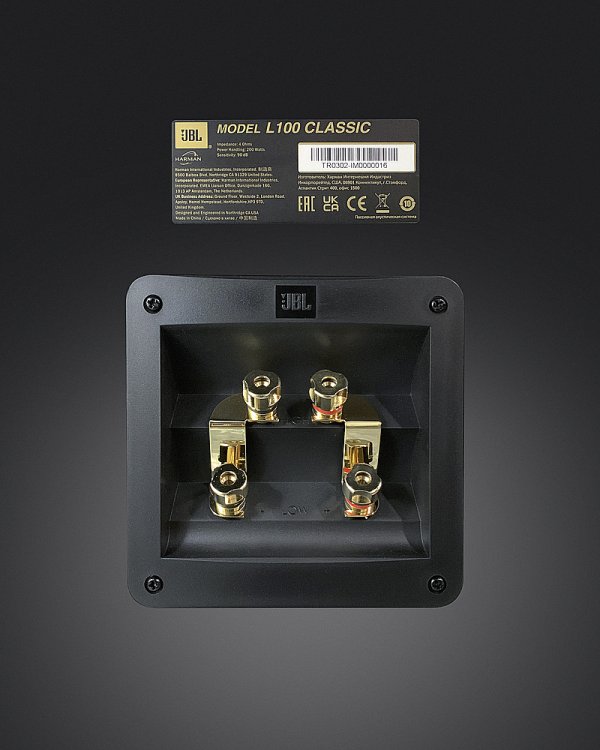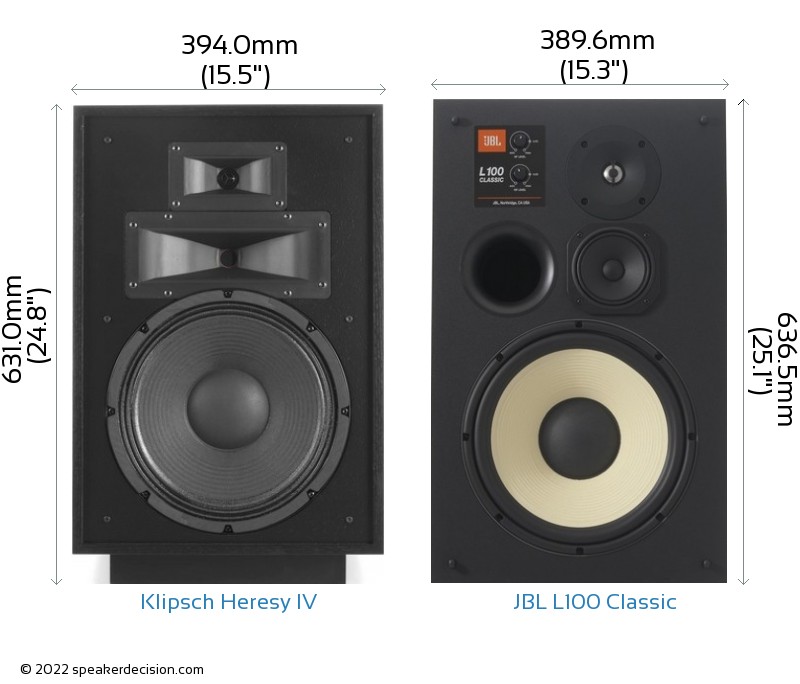In this review, we will be comparing two different type of speakers . Klipsch Heritage Heresy IV is a Floor-standing speaker whereas the L100 Classic is a Bookshelf speaker.
Let's have a brief look at the main features
of Klipsch Heresy IV and JBL L100 Classic first before getting into our more
detailed comparison.
Klipsch Heresy IV Key Specs
- 3-way Design
- 1" horn-loaded Tweeter
- 1.75" Midrange
- 12" Fiber-composite Woofer
- 48-20k Hz Frequency Response
- 99 dB Sensitivity
- Impedance: 8ohms
- Power Range:up to 100watts
- Weight:20.45kg
- Dimensions (H x W x D): 631.0" x 15-1/2" x 13-1/4"( 631.0 x 394.0 x 337.0mm )
JBL L100 Classic Key Specs
- 3-way Design
- 1" Dome Tweeter
- 5.25" Midrange
- 12" Pulp Woofer
- 5.25" Midrange
- 40-40k Hz Frequency Response
- 90 dB Sensitivity
- Impedance: 4ohms
- Power Range:25-200watts
- Weight:26.70kg
- Dimensions (H x W x D): 636.5" x 15.3" x 14.6"( 636.5 x 389.6 x 371.5mm )
In the following sections, we will get into more detail in order to better understand how the Klipsch Heresy IV and JBL L100 Classic compare and hopefully end up with enough arguments to decide which one of these loudspeakers is the better choice for you.
**This post contains affiliate links, and I will be compensated if you make a purchase after clicking
through my links. As an Amazon Associate I earn from qualifying purchases.
Drivers
Both Heresy IV and L100 Classic are 3-way speakers.
| Driver |
Klipsch Heresy IV |
JBL L100 Classic |
|
Driver Setup
|
3-way
|
3-way
|
|
Tweeter
|
1-inch
|
1-inch
|
|
Midrange
|
1 x 1.75-inch |
1 x 5.25-inch |
|
Woofer
|
1 x 12-inch
|
1 x 12-inch
|
Heresy IV features a 1" titanium-diaphragm compression horn-loaded Tweeter , a 1.75" Midrange and 1 x 12" Fiber-composite Woofer . On the other hand, the L100 Classic features a 1" Titanium Dome Tweeter , a 5.25" Midrange and 1 x 12" Pulp Woofer with a Crossover frequency at 450Hz and 3500Hz.
Frequency Response
Heresy IV has a frequency range of 48-20k Hz whereas L100 Classic has a frequency range of 40-40k Hz. With a minimum frequency of 40Hz, the L100 Classic can go significantly deeper on the low side and provide stronger bass compared to the Heresy IV's min frequency of 48Hz.
Below graphs depict how these two speakers compare with the max, min and average values of the Min and Max Frequencies of other speakers in the Floor-standing class in our database.
Low Frequency
Floor-standing Speakers
High Frequency
Floor-standing Speakers
None of these speakers achieves full range experience which is commonly agreed as 20Hz-20kHz. In order to achieve lower lows / deeper bass, we recommend you pair these with a subwoofer. Visit our Powered Subwoofers section to find out more about the available options.
Impedance and Sensitivity
Heresy IV is a 8 ohms speaker compared to the L100 Classic which has a nominal impedance of 4 ohms. Lower impedance speakers, especially the ones that are rated at 4 ohms may put more pressure on the amplifier unit especially when played at high volume levels, so make sure the amp you pair with the L100 Classic can provide this impedance level.
These two speakers also have different sensitivity levels. Heresy IV sensitivity is rated at 99 dB and the L100 Classic's is rated at 90 dB. This 9 dB difference makes the Klipsch Heresy IV a more sensitive speaker compared to JBL L100 Classic, hence will play louder with the same amount of watts.
Sensitivity
Floor-standing Speakers
Power Range
Power
range is the range of input power in watts RMS that a loudspeaker is designed to handle. While using
an amplifier within this range ensures the nominal performance , inputting a power that is higher than the
max wattage can result in a damaged speaker.
Heresy IV can handle a max power of 200 watts RMS from the amp the whereas Heresy IV has a max power handling value of 100 watts RMS , 100 watts less than the L100 Classic.
Keep in mind that a higher max power handling value doesn't necessarily make that a louder speaker
compared to a lower max handling speaker. Loudness or the sound level is also impacted by parameters
such as Impedance, sensitivity and system efficiencies.
Input Type and Bi-Amping / Bi-Wiring
Heresy IV features 5-Way post posts which make bi-amping or bi-wiring possible. L100 Classic has a Five-way gold-plated binding posts which doesn't feature bi-amping/bi-wiring.
 JBL L100 Classic's Five-way gold-plated binding posts terminals
JBL L100 Classic's Five-way gold-plated binding posts terminals
Physical Specs
Size of a speaker can sometimes become an important decision factor due to space constraints or in some cases purely for esthetic reasons. In this section, we are going to compare Klipsch Heresy IV's and JBL L100 Classic's external dimensions. Klipsch Heresy IV has external dimensions of 631.0 x 394.0 x 337.0mm ( 24-13/16 x 15-1/2 x 13-1/4inch) whereas JBL L100 Classic has external dimensions of 636.5 x 389.6 x 371.5mm ( 25.0 x 15.3 x 14.6inch) .
Klipsch Heresy IV is 5.5mm shorter and 34.5mm less deeper than JBL L100 Classic but it is also 4.4mm wider.
Below you can see the front view size comparison of Klipsch Heresy IV and JBL L100 Classic in scale.
 Comparison image of Klipsch Heresy IV and JBL L100 Classic Size and External Dimensions
Comparison image of Klipsch Heresy IV and JBL L100 Classic Size and External Dimensions
Base Surface Area Comparison
Base surface area of a loudspeaker may become a determining factor when the space in your room or desk is limited.
The base surface area of the Klipsch Heresy IV is approximately 1327.8cm2 / 205.8inch2 and base area of the JBL L100 Classic is approximately 1447.4cm2 / 224.3inch2. The Heresy IV requires 8% less surface area than the L100 Classic which gives it a small advantage on placement in tight spaces.
What's in the Box of Klipsch Heresy IV?
Here are the items that are included inside the box of Heresy IV:
2 Floor-standing loudspeakers2 Detachable grilles (installed)2 Base risers (installed)8 Self-adhesive rubber feet4 Jumper-straps (installed)Owners ManualCongratulations letterKlipsch brochure
What's in the Box of JBL L100 Classic?
Here are the items that come with the L100 Classic:
Bookshelf loudspeaker
Grille
Owner's Manual